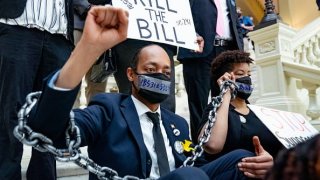
- Despite corporate initiatives, diversity and inclusion scorecards, and ongoing pronouncements about anti-discriminations policies, companies are losing talent because they haven't created a culture that is truly welcoming.
- A recent Harris Poll survey done with JUST Capital showed that 95% of Black Americans believe that it's important for companies to promote racial equality, and 80% believe they can do more.
- Mary-Frances Winters writes in her recent book, "Black Fatigue: How Racism Erodes the Mind, Body, and Spirit," that organizations need to create a "brave space" for what may be uncomfortable conversations between managers and employees.
The pandemic has brought to the surface so many of the issues that organizations have been grappling with for decades. Productivity, employee engagement, retention, and trust are just a few that are being redefined in this new and next world of work.
But there's likely no thornier issue that companies are contending with today than diversity and inclusion. Mary-Frances Winters, founder and CEO of The Winters Group, a global diversity and inclusion consulting firm, has spent over three decades working with organizations to address these issues, and says that organizations clearly need a new approach. Speaking at CNBC's recent Workforce Executive Council member forum, she explained to the human resources executives in attendance how little change the status quo is providing.
"I started my business 37 years ago and we're having the same conversations because we haven't made progress," she said. Despite myriad corporate initiatives, diversity and inclusion scorecards, and ongoing pronouncements about anti-discriminations policies, companies are losing talent because they haven't created a culture that is truly "welcoming for groups that have been historically marginalized," she added.
The racial unrest that has plagued the country since last summer, coupled with the devastating financial and health impact of the pandemic on Black Americans and other minority communities, has put renewed pressure on corporate leaders to address the ways in which racism affects not only their workforce, but the communities in which they operate. A recent Harris Poll survey done with JUST Capital, an independent research nonprofit, showed that 95% of Black Americans believe that it's important for companies to promote racial equality, and 80% believe they can do more.
Get Tri-state area news delivered to your inbox. Sign up for NBC New York's News Headlines newsletter.
As a result, workers, customers, civic leaders and investors are expecting corporations to step up and drive that change. The problem, said Winters: There's little tolerance for the often sensitive conversations that need to take place in order for things to improve. Managers, she adds, often say they feel uncomfortable discussing racial issues with employees who don't look like them, or share similar educational or family backgrounds. That needs to end, she said. "I'm getting really tired of hearing that managers are uncomfortable," Winters explained. "There are a lot of things in life that are uncomfortable. That's no longer an excuse to not have these conversations."
Money Report
In her recent book, "Black Fatigue: How Racism Erodes the Mind, Body, and Spirit," Winters writes about the idea of organizations creating what she calls a "brave space" for conversations between managers and employees to take place. "We've spent so much time talking about creating a safe space, but that doesn't take anyone out of their comfort zone so that the really hard conversations can happen," she said. Creating a brave space allows managers the freedom to admit that there are things they don't know about minority employees, but that there is room to ask questions.
"We have to give people some slack when they don't know everything and offer some grace and forgiveness as leaders work their way through these conversations," she added. "Not this cancel culture where if you say one wrong thing and it's over. That doesn't help anyone."
The ability for a manager to say to a minority employee: "I know I'm in territory that I don't know enough about, so I'm asking you for some grace before we start talking," can go a long way in building trust within an organization, she added.
C-suite must model the right behavior
She also cautioned the CHROs in attendance to be aware of CEOs who talk about diversity and inclusion, but expect managers to define what that looks like throughout the organization. "The most senior leaders must establish the expectations for all other leaders and employees, and then model that behavior," Winters said. "Then they have to establish real consequences for people not demonstrating those behaviors."
JUST Capital recently launched its corporate racial equity tracker that offers an in-depth accounting of the state of disclosure by the 100 largest U.S. employers across six specific dimensions of racial equity. They include anti-discrimination policies, pay equity, racial and ethnic diversity data, and even a company's response to mass incarceration.
Nearly all of these leading companies have baseline DE&I policies and commitments in place, according to JUST Capital. But active measures — such as setting diversity targets or analyzing pay equity—were in place at about one-third of the companies.
"It's clear from the data that the majority of Americans believe corporations play a defining role in shaping our nation," said Yusuf George, managing director of corporate engagement at JUST capital in a recent CNBC interview. "Companies are good at disclosing baseline DEI policies, but not so good at showcasing the actions they're taking towards their progress. We're calling on companies to be transparent about this information so that people can see which companies are actually making progress."






